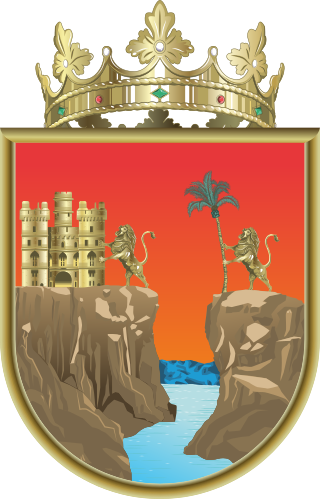
Mexican literature stands as one of the most prolific and influential within Spanish-language literary traditions, alongside those of Spain and Argentina. This rich and diverse tradition spans centuries, encompassing a wide array of genres, themes, and voices that reflect the complexities of Mexican society and culture. From ancient indigenous myths to contemporary urban narratives, Mexican literature serves as a poignant reflection of the nation's essence, inviting readers to explore its rich history, diverse culture, and collective aspirations.

The Madrid Royal Conservatory is a music college in Madrid, Spain.

The governor of Chiapas is the chief executive of the Mexican state of Chiapas. The state constitution stipulates a term of 6 years, to which governors can only be elected once. It also specifies the qualifications for becoming governor: a Mexican citizen by birth, aged at least 30 years old, and having not less than 5 years residency in Chiapas. The current governor is Rutilio Escandón from the MRN, who assumed the position in 2018.

Aventuras en el tiempo is a Mexican comedy drama telenovela produced by Rosy Ocampo for Televisa in 2001.

El diario de Daniela is a Mexican child telenovela produced by Rosy Ocampo for Televisa in 1998.
The National Prize for Arts and Sciences is awarded annually by the Government of Mexico in six categories. It is part of the Mexican Honours System and was established in 1945. The prize is a gold medal and 520,000 pesos.

The Guadalajara International Film Festival is a week-long film festival held each March in the Mexican city of Guadalajara since 1986.

Álvaro de Figueroa y Torres-Sotomayor, 1st Count of Romanones was a Spanish politician and businessman. He served as Prime Minister three times between 1912 and 1918, president of the Senate, president of the Congress of Deputies, Mayor of Madrid and many times as cabinet minister. He belonged to the Liberal Party. Romanones, who built an extensive political network, exerted a tight control on the political life of the province of Guadalajara during much of the Restoration period. He also was a prolific writer, authoring a number of history essays.
The National Exhibition of Fine Arts was a regular event that took place in Spain from 1856 to 1968; usually in Madrid. These exhibitions were in the form of a competition, established by a Royal Decree from Queen Isabella II in 1853. It was the largest official exhibition of Spanish art.
La antorcha encendida is a Mexican telenovela produced by Ernesto Alonso and Carlos Sotomayor for Televisa in 1996. It was the last historical telenovela produced by Televisa. The plot tells the Independence of Mexico, with an emphasis on historical accuracy. It was written by Fausto Zeron Medina in collaboration with Liliana Abud. It premiered on Canal de las Estrellas on May 6, 1996, and ended on November 15, 1996.
Las aventuras de Pito Pérez is a 1957 Mexican film directed by Juan Bustillo Oro and produced by Fernando de Fuentes, and starring Germán Valdés. It is based on the 1938 novel La vida inútil de Pito Pérez by José Rubén Romero.
The following lists events that happened during 2000 in Mexico.
Un rostro en mi pasado is a Mexican telenovela produced by Ernesto Alonso for Televisa in 1989. Based on the Mexican telenovela produced in 1960 Un rostro en el pasado.
Bianca Vidal is a Mexican telenovela produced by Valentín Pimstein for Televisa in 1982. Bianca Vidal was based on the soap opera María Salomé, original of Inés Rodena which was then elongated by Sacrificio de mujer from the same author.

La Fiera is a Mexican telenovela produced by Valentín Pimstein for Televisa in 1983.
María del Dulce Nombre Díaz Ruiz better known as Marujita Díaz was a Spanish singer and actress. She was born in Seville, Spain. Díaz was known for presenting the very popular show Música y estrellas. She also appeared in the films A Cuban in Spain (1951) and La pérgola de las flores (1965).

Amores, querer con alevosía is a Mexican telenovela that originally aired on Azteca Trece from January 15, 2001 to June 22, 2001. The telenovela was created by Bernardo Romero Pereiro and Jimena Romero for the company TV Azteca. It stars by Bárbara Mori and Christian Meier.
The Mexican animation industry is a part of Mexico's domestic film industry. It utilizes primarily the flash, CG, and traditional animation formats, typically produced on a small budget. There studios included Ánima Estudios, Animex Producciones, Huevocartoon, among others. It began in 1915 with the first animated film of the country, Mi Sueño, and continues decades later.

Roy del espacio is a 1983 Mexican animated science fiction film produced and directed by Hector López Carmona, Rafael Ángel Gil and Ulises Pérez Aguirre. Produced from 1979 to 1982, it is one of the first feature-length Mexican animated films ever made. Its plot follows the titular Roy, who, along with Dr. Faz and psychologist Elena, travels to a distant planet and faces an evil emperor who wants to conquer the Earth. Roy del espacio premiered on 3 March 1983, playing in several theatres in Mexico.










